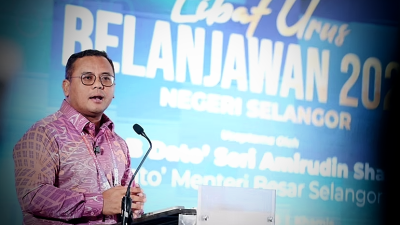By Wong Tai-Chee
On June 15, Azman Ujang, the former Chairman of the Malaysian National News Agency, wrote an article calling for the appointment of non-Malays as presidents of public universities. Such call is indeed highly appreciated. But after thinking about it, I feel that the term "appointment" is inappropriate. As the article did not talk about any reform and the kind of advantages a non-Malay president would bring to the Malaysian academic institution, I wish to make some supplements to this issue.
Azman admitted that for decades, the posts of president and vice-president of the Malaysian public universities have borne the stigma of "political office", and this has caused serious damage to higher education as an institution. Nevertheless, if the appointment system continues to be used, even if the president is changed to ethnic Chinese or Indian, its effect on the improvement of public universities is very likely to be insignificant. Why do we say that?
First, in the current coalition government that is in power, the appointment is inseparable from the compromise or negotiation results of its coalition parties. If you want to appoint a Chinese or Indian as the president, it is conceivable that MCA might be asked to look for an ethnic Chinese and Indian Congress Party would have to pick an Indian. Recommended candidates, as can be imagined, would be inseparable from their political leanings, which is natural.
Second, the appointed Chinese or Indian president would be alone when they enter a public university to take charge. He or she would be surrounded by almost exclusively Malay senior executives, especially in the decision-making senate. These senior government servants have been well protected and it would be extremely difficult for the new president to push through his/her reformist agenda, if any and get things done. Should they choose to do nothing and just make everybody happy, it's better not to have an ethnic Chinese or Indian as president at all!
If we want to achieve effective reform over some current undesirable university administrative practices, it is good to refer to the recruitment methods of some reputed universities in the world.
Let's start with Nanyang Technological University in Singapore, where since Xu Guanlin stepped down in 2011, the presidency was taken over by a Swedish scholar, Bertil Anderson, who for over seven years as president led the university to 11th place in the QS World University Ranking in 2017. During his tenure, the university was named by QS the World's Best Youth University under the age of 50 for four consecutive years. The next president, who succeeded him in 2018, is Subra Suresh, an Indian-American internationally renowned scholar who has made outstanding contributions to the discipline known as "Intersection of engineering, biology and medicine". The new President was selected by Nanyang Technological University's eight-person Select Committee after a cumbersome screening interview during a wide-ranging recruitment process to Singapore and around the world.
Another to quote is the University of Nottingham in the United Kingdom. In 2001, the university hired Professor Yang Fujia, a former president of Fudan University, as its president, who ran the prestigious university for three consecutive terms for 12 years, pushing the university's performance to another peak. Naturally, the screening process was fair and rigorous, which was based on academic achievements, experience and ability to manage a university well, and was not interested to consider the racial origin of the candidate.
In North America, Western Europe, Australia and New Zealand, public university presidents are generally not appointed by government or recommended by political parties. Universities have their own more independent basic freedoms, with a strict selection system specifically responsible for the president and other senior personnel appointments. More importantly, the post of president of the university does not stipulate that it must be a local citizen or a specific ethnic group, not to mention features like religious, gender or cultural background. Recruitment is usually open to the whole world. As long as you have high academic standards, good management and language communication and social skills, you have the opportunity to become a candidate.
However, some Western European universities adopt an electoral system, focusing on candidates with ties or work with the university. They believe that, in order to better understand the university's culture and philosophy, such candidates would find it easier to integrate into the working environment they are familiarized with and to promote the university’s development. France generally adopts this system. Candidates are not limited to French nationality, and they have to propose their own candidature and do their own publicity. Voting is by all the university staff. After the expiration of the first four-year term, he/she can seek re-election for only once.
In the United States, most of the leading universities are private, and their selection process for university presidents is not the same as in Western Europe. The power of private universities to select university presidents is concentrated in the select committee of the Board of Directors which consists of members of the board, faculty representatives, and administration and alumni representatives. Basic qualifications of the president include academic background, personality quality, administrative ability and even fund-raising potential. The Select Committee interviews qualified candidates, conducts an examination of their management thinking and philosophy, and public relations skills. The right candidate is finally elected through voting by all members of the Select Committee.
From the selection system of university presidents in the West, we can see that, although their operation methods are specific and not completely identical, the university as an academic institution, has a high degree of exclusive thinking. Their autonomy to create high-quality education principles is largely similar. With financial sources coming from the tax payers, the ministry of education’s managerial and supervisory role includes scientific research orientation, teaching quality, campus learning environment, student performance, etc. But it has a high degree of respect for the autonomy of universities, and political interference is extremely low.
Since the 1980s, on the other hand, public universities in Malaysia have basically become the manifest carrier of Malay racism and party politics, and the appointment of presidents has to be matched by the demands of the political parties in power, which have a relatively high political texture. The obvious flaw in the political appointment of presidents is that it dilutes the deserved nature of the university independence. Because presidents are appointed, they are more inclined to be responsive only to the top, and see a low priority to listen to their peers or subordinates. As such, it would be much more difficult to expect them to be administratively innovative, and have the courage or spirit to drive a dynamic leadership to change for the better. Instead, their priority could be just keeping the status quo, thus avoiding making any mistakes.
As a matter of fact, the policy of racial discrimination has a long history in the administrative system of the Malaysian public universities and it has accumulated many ills. Yet, there is no indication that the government has any intention of reforming it. It's hard to guarantee that an ethnic Chinese or Indian president will play an effective role in the deep-rooted Malay dominated campus culture. If appointed, they may not even finish their term and resign because of the unfriendly working environment. Untying the ringer of the bell must depend on the bell man himself; the determination to reform has to come from the ruling racist core!
(Wong Tai-Chee has his B.A and M.A degrees in Urban and Regional Planning from the University of Paris, and earned his PhD in Human Geography from the Australian National University. After teaching 20 years in Nanyang Technological University, Singapore, he retired in 2013. He then worked as Distinguished Professor for two years at Guizhou University of Finance and Economics, China, and as Dean and Professor at the Southern University College, Johor until the end of 2018. He was Visiting Professor to University of Paris (Sorbonne IV), Visiting Fellow to Pekin University, Tokyo University and University of Western Australia. His main research interests are in urban and economic issues, and more recently on Malaysian politics. Besides his 15 self-authored and edited book volumes, he has written over 100 academic articles and published widely in international journals.)
ADVERTISEMENT
ADVERTISEMENT


































